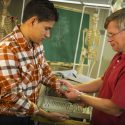The business credentials of language learning
When Dianna Murphy, associate director of the University of Wisconsin–Madison Language Institute, graduated with a degree in Russian in 1989, she had two career options: work in government or teach.
This was the case for many language students at the time, but Murphy says a lot has changed since then.
“There are so many things you can do today with languages, primarily in business,” Murphy says. Today’s globally connected business world has opened the floodgates on career possibilities for students with foreign language skills.
The Language Institute is helping students recognize the importance of studying foreign languages and preparing them to enter a global economy. Part of the College of Letters and Science, with substantial support from the Division of International Studies, the institute takes language studies beyond the classroom through collaborative outreach programs for high school and undergraduate students.
During one such event, World Languages Day, the institute invites more than 700 Wisconsin high school students to the campus to learn about different languages and cultures. The program plants the seed early that language acquisition is a smart career strategy.
According to Language Institute Director Sally Magnan, “The idea is to expose the students to languages that maybe they’ve never heard of before.”
Although much of its efforts are focused on students as future global communicators, the Language Institute understands the urgent demand for professionals to expand their language abilities while maintaining their businesses. This year, the institute is developing online courses in Conversational Chinese for Business Professionals and Elementary Urdu. Magnan hopes to continue developing these programs and also additional language courses online in the future.
Another program – Languages for Life – focuses on the campus community by hosting guest speakers who have graduated from UW–Madison to discuss the real-world application of their language degrees. “The biggest benefit is for people to see language learning as a real and necessary part of their professional as well as their personal lives,” Magnan says.
The series recently showcased Karina Shook, a NASA mechanical engineer with a degree in engineering and Russian; and Anthony Shadid, a Pulitzer prize-winning journalist who studied Arabic at UW–Madison.
Kathleen Egan, the head of the language research and development program within the U.S. Department of Defense, spoke at the November 2006 Language for Life event on campus. A UW–Madison graduate, Egan shared with a crowded room of undergraduate students new computer translation programs and also stressed the importance of language learning in a global environment.
“It’s more than knowing the grammar. It’s more than knowing the culture,” Egan told the audience. “It’s understanding the hearts and minds of others.”
Egan also debunked myths and worries about career limitations for language students, saying that the need for foreign language skills is growing especially in communications, government, business, medicine and social services.
Tiffany Iliadis, a junior studying Chinese and a frequent Language for Life event attendee, says the guest lectures are highly beneficial for language students. Although she considered studying Chinese at other universities, she says she fell in love with the Chinese department at UW–Madison after her first year.
Iliadis’s real passion lies within the practice of traditional Chinese medicine. Having studied yoga and worked in an herbal medicine store, Iliadis says she hopes to use her language degree as a passport to reach her career goals. It’s one of the scores of creative ways in which students are putting language skills to work.
Magnan says the student-focused programs such as Languages for Life will motivate future business leaders to include language study in their college plans.
“If [students] understand that language is going to be an asset to them, then they’re going to learn more than one language and down the line, they’ll enter companies with much more expertise,” Magnan says. “Although English is often used as a ‘lingua franca’ – or universal language of commerce – business doesn’t get conducted in just English anymore.”
Murphy agrees, noting that picking up cultural cues is just as vital as understanding the language. “It’s increasingly important that our students are able to interact with others who are different than they are,” she says. “The stereotype of the boorish American charging into a business situation doesn’t fly anymore.”
The Language Institute, along with the National Council of Less Commonly Taught Languages, has also received funding from the U.S. Department of Education to develop online methodology courses for postsecondary teachers of languages other then French, German, Italian and Spanish. With yet another Department of Education grant, the institute is also developing advanced materials for Central Asian languages Kazakh and Uzbek.

